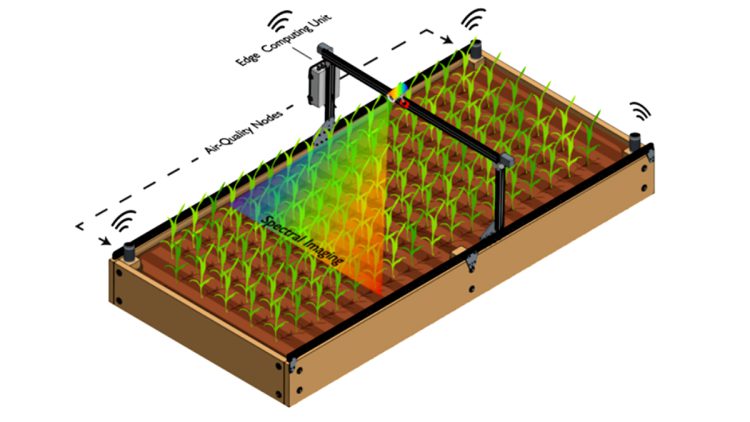The agricultural sector of Pakistan is indispensable to the country’s economic growth and food security. The project titled, “Multifaceted Crop Scouting using Industry 4.0”, is a synergistic research approach that brings together leading research institutions and industry in developing a smart and sustainable farming solution using latest precision agriculture practices. SEECS faculty member, Dr. Rafia Mumtaz, and NCAI Team Prof. Dr. Yasar Ayaz (SMME-NUST), Prof. Dr. Faisal Shafait (SEECS-NUST), Dr. Gul Muhammad Khan (UET, Peshawar), Dr. Muhammad Khurram, (NED Karachi) jointly won the grant worth Rs 74 million under Higher Education Commission Center of Excellence (COE) grants. Principal Investigator of the project, Dr Rafia Mumtaz is an active renowned researcher of SEECS in the field of precision agriculture using IoT and ICT technologies. The industrial partner of this project include Chatta bio care, Concave Agri, and Crop2X pvt limited.
Research project implements a multifaceted approach of crop scouting utilizing spectral imaging technology and industry 4.0 duly integrated with Internet of things (IoT) framework and AI. The significance of this system can be found in the data-driven solution that can be used in agricultural research to develop or re-enact effective cropping systems. This multidisciplinary project will fuse expertise of multiple sectors including agricultural sector, research sector, technological, and industry.
Some of the problems that this research targets are mentioned below:
- Efficient use of farming inputs, such as water, seeds, and fertilizers.
- Combating prevalence of common crop related diseases, such as yellow rust in Wheat.
- Poor soil quality which directly affects crop health.
- Environmental Impact of irresponsible practices in farming, such as use of pesticides and high amounts of fertilizers.
- Measuring the effect of air pollution on crop yields.
- Empowering farmers with state-of-the-art technologies through awareness programs, as well as partnering with local industry to promote smart farming.
Since the initial objective of this research is to develop a proof-of-concept, it must be conducted in a controlled environment, however the concept can potentially be scaled up in the future. For the case study, we propose to utilize an open-source platform for the precision agriculture system: FarmBot. The contemporary architecture of this platform offers monitoring of the pre-harvesting processes including sowing, weed control, and watering. These functions are achieved through multiple sensors including weed suppressors, soil sensors, watering tools, and seed injectors. The system is powered by IoT technology hence these external sensors are used to capture crucial information about the crops which is then combined with data from an open-source crop database to provide the user with an optimized planting plan using machine vision technique. However, the novelty of our research will investigate integration of spectral imaging technology that examines crop-health through disease monitoring and chemical analysis of the soil, along with ambient monitoring (i.e., sensing greenhouse gasses and their effects on crops).
This manipulative strategy of this open-source project will be carried out in collaboration with leading researchers and industry experts. Spectral imaging will enable a much more comprehensive level of inspection of crops as well as the soil, which will include various state-of-the-art monitoring indices such as determining vegetation index, quantification of soil properties, disease detection in plants, ingredient uniformity evaluation, freshness, etc. For this purpose, we will utilize a spectral camera that matches the spectral ranges of these indices.
Importance and anticipated impact of this research
This project lies at the intersection of different sectors of Pakistan like the agricultural sector, the research sector, the technological sector, and the industrial sector. The objective of this project is to add value to these multiple sectors with a focus on promoting smart and sustainable farming practices. The farmers in this country will be provided with modern technological equipment which will enable them to monitor the different phases of harvesting effectively. The process of sowing, weeding, and watering will be automated, and the farmers will receive extremely useful insights about their crops with the help of spectral imaging. The project aims to provide users with a completely customizable farming experience and enhance the quality of their vegetation using state-of-the-art technology. This system will revolutionize the way we conduct agriculture in the country.
In addition to improving the farming experience, the project will also have a huge positive impact on the researchers of the country. As this is an IoT based solution, tons of data will be collected daily. This data will prove to be very useful in conducting research and drawing conclusions about the different aspects of agriculture. First and foremost, the project will enable researchers to study the effect of air quality on the crops and how to use air quality monitoring as a tool for better vegetation. In addition to this, the spectral imaging will facilitate a thorough inspection of the soil quality and vegetative diseases, if any. The project will also provide a platform for collaboration between the research sector and the industry. In short, this solution aims to integrate contemporary technological advances in the industry in the agricultural sector of Pakistan.
The author is a Tenured Associate Professor and Director at Internet of Things (IoT) Lab at NUST School of Electrical Engineering and Computer Science. She can be reached at rafia.mumtaz@seecs.edu.pk.
Research Profile: https://bit.ly/36i7Oti
![]()






